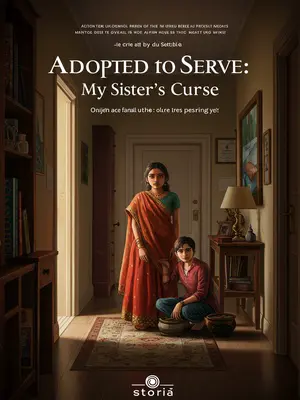Chapter 4: Humiliation and New Friendships
Neha’s prediction wasn’t wrong. In fact, Arjun Kapoor’s bullying began even earlier than in our previous life.
First week of school, my new shoes already wet with mop water, boys in branded shirts crowding the corridor.
At school, my head was shoved into a washbasin, surrounded by a group of boys laughing and jeering.
The water was cold, metallic, echoing with the sound of their hoots and ‘chal, chal, dekhte hain kya karti hai yeh’.
Just as I was about to run out of breath, someone grabbed the back of my neck and yanked me up. Arjun Kapoor looked at me, grinning.
His grip was firm, his eyes glinting with malice. The boys started recording on their phones, sniggering, ready to send the video to the class WhatsApp group.
‘If you want my family’s money, that’s fine.’
His voice was cruel, loud enough for everyone to hear. The corridor suddenly felt colder.
‘Drink all the water in the toilet. For every sip, I’ll give you a lakh. How about it?’
His friends whooped and jeered.
They started chanting, ‘Do it! Do it!’ as if this was some IPL match, not a humiliation.
I looked at Arjun Kapoor.
His face blurred between the boy who once whispered, ‘You’re different,’ and the monster before me now. The taste of betrayal was bitter, sharper than the water I’d nearly swallowed.
In my previous life, this man who had softly confessed his love to me was now unleashing his cruelty on me without restraint.
The memory was fresh: roses in a crystal vase, soft words under the Diwali lights, his hands brushing mine. Now, those same hands only pushed and punished.
But Arjun Kapoor wasn’t really looking at me.
His gaze drifted past me, focusing on someone behind me.
I knew Neha Mehra was bent over behind me, scrubbing the floor.
Her wrists were thin, her hair tied in a messy plait. The cheap bangles she wore rattled as she worked, the echo lost in the wide corridor.
‘Isn’t that Neha Mehra?’
‘Why is she still cleaning the floor?’
A friend explained to Arjun Kapoor, ‘Neha Mehra’s mother is the school cleaner. She goes to school during the day and helps her mother with chores at night.’
‘Sahi hai, yaar, kitni mehnat karti hai,’ another boy muttered under his breath, more impressed than mocking.
A flash of surprise crossed Arjun Kapoor’s eyes, then a hint of sympathy.
Something softened in him, the Prince of Mumbai taking pity on the peon’s daughter, the script practically writing itself.
He shouted at Neha Mehra, ‘Arrey, it’s freezing. Stop cleaning. No one’s going to check anyway.’
His voice was softer, almost gentle, like he was already rehearsing his new role as protector.
Neha Mehra straightened up, her black hair falling over her shoulders, her delicate face set in stubbornness.
She wiped her hands on her dupatta, back straight, chin up—acting the part perfectly.
She shook her head. ‘I can’t.’
Her voice was quiet but resolute, echoing in the corridor louder than any shout.
‘If someone comes to check and finds the floor dirty, my mother’s wages will be docked a thousand rupees.’
‘One thousand rupees…’ the boys murmured, as if it was Monopoly money.
‘I know a thousand rupees means nothing to a rich boy like you, but to my family, that’s a week’s food money.’
Her words cut through the air, sharper than the bleach she scrubbed with.
With that, Neha Mehra bent down and continued scrubbing.
You could see the calculation in her eyes—every gesture perfect for maximum sympathy.
Actually, Neha’s intentions were obvious. With so many floors, she chose to clean right in front of Arjun Kapoor. She even let her hair down, found the perfect angle, and presented herself at her prettiest.
She’d learned from the best: the heroines on TV who cry just enough, who work just hard enough, to make the hero fall at their feet.
Unfortunately, Arjun Kapoor fell for it.
Just as expected, the Kapoor Prince played right into her hands.
Sure enough, Arjun Kapoor walked over, helped Neha up, snatched the rag from her hand, and tossed it to his friends.
‘You guys, help her finish cleaning the floor.’
He gave orders as if he owned the place, and his friends listened, half-mocking but obeying all the same.
He glanced at Neha’s hands, red from the cold, thought for a moment, then draped his blazer over her shoulders.
‘It’s so late—how are you getting home?’
His voice was softer now, a thread of concern woven in.
‘By cycle.’
Her voice was small, almost shy, eyes lowered just so.
‘You’re riding a cycle in this weather?’ Arjun Kapoor was shocked, then said firmly, ‘Go wait downstairs. I’ll have my family’s driver drop you home.’
He clicked his tongue, muttered something about ‘Mumbai winters’, already waving for his driver.
Neha, protected by Arjun Kapoor, left.
She clung to the blazer as if it was a crown, glancing back at me with a look that said, ‘See, who’s the real heroine now?’
Before leaving, she looked back at me in my sorry state and gave me a mocking smile.
There was triumph in her eyes, the kind you only see when someone thinks they’ve finally won.
A moment later, everyone was gone, and I was left alone by the washbasin.
The corridor was suddenly silent, just the steady drip of the tap and my own ragged breathing for company.
My eyes stung, but I blinked hard. Amma always said, ‘Ladkiyan nahi roti sabke saamne.’ I swallowed the lump in my throat, refusing to let even a single tear fall.
I struggled to my feet, wiping the water from my hair with my sleeve.
‘Use this.’
A cool voice sounded behind me.
I turned. It was our class prefect, Priya Sharma.
She stood there in her neat uniform, always tucked in, always spotless—even the buttons were shiny. Her hair was in a plain braid, and she wore shoes polished to a mirror shine, no matter how poor her home might be. Her schoolbag was patched at the corners, and a faded rakhi dangled from her wrist—maybe the only gift her brother ever gave her.
She was a quiet girl, always hardworking, always in long sleeves no matter the season.
Rumours went around that she wore full sleeves to hide bruises. But no one really knew her story, just that she always kept to herself, never missed a homework deadline.
In my previous life, she had also helped Neha when she was bullied.
I remembered the moment: a small hand offering a towel, her eyes kind but tired.
She had offered Neha a towel and encouraged her to report Arjun Kapoor’s bullying.
She’d said softly, ‘Don’t be afraid. I’ll stand with you if you speak up.’
But Neha slapped her hand away.
Neha’s voice was sharp, her pride hurt. ‘What do you know? That’s my brother.’
At that time, Neha was still hoping Arjun Kapoor would fall for her.
She’d whispered to me later, ‘Didi, one day he’ll love me. You see.’
After that, Priya Sharma stopped interfering and returned to her solitary life.
She became almost invisible, as if the world had taught her not to expect gratitude for kindness.
Later, near board exams, Priya Sharma committed suicide.
The news reached us on the morning of our math paper. No one talked about it much; teachers just said, ‘Bachchi ko toh pehle se hi kuch dikkat thi.’
Only then did we learn that her family was desperately poor, her grandmother bedridden, her father a gambling addict who abused her and even tried to sell her to pay off debts.
Her story was whispered over lunch breaks, the details changing each time, but the sadness remaining the same.
Now, she stood beside me, holding out a clean towel.
Her hand trembled just a little, but her eyes met mine—steady and brave.
I hesitated for a moment, then took it.
The towel was soft, smelling faintly of Nirma soap. For a moment, I felt less alone.
She didn’t say much and turned to leave, probably thinking there was nothing to say to a Kapoor family heiress like me.
Her shoes made no sound on the tiles, her presence shrinking as she retreated.
As she was about to disappear, I suddenly called out.
‘Prefect.’
The word hung in the air, unfamiliar on my tongue.
She stopped.
I scratched my head. ‘Um, I just transferred here and don’t know my way around. Where’s the canteen? Can you take me?’
She looked surprised, lips parted as if to protest, but then nodded, a hint of a smile breaking through.













